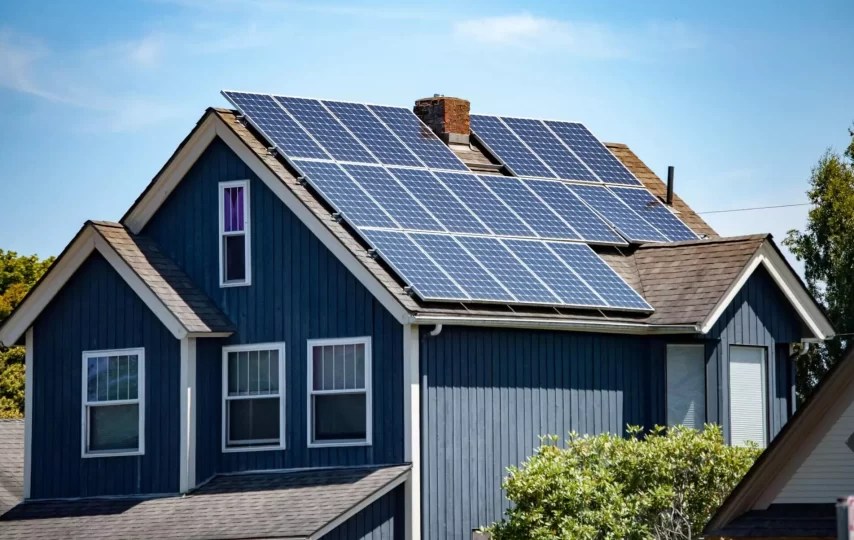For one thing, many homeowners have sought solar panels and install solar panel as a resource in the world’s quest for sustainable energy. The technology harnesses sunlight and converts it into electricity. This greatly reduces one’s dependency on fossil fuels and lowers utility bills. However, just like any other investment, one may naturally have a question: is it cost-effective to install home solar panels? This article explores the economics involved with solar energy, the different inverter options available, and a look at some long-term benefits one may reap from such an installation to understand if the investment is indeed worth it.
Understanding Solar Panels and Inverters
First, understand what makes up the unit before considering the cost-effectiveness of solar panels. The solar panels work by producing DC electricity from sunlight. However, most home appliances operate on AC electricity, which is also the type of electricity fed into the electrical grid. Consequently, the solar inverters change the DC electricity produced by solar panels into AC.
1. 5kW On-grid Inverter:
This inverter size will suit the needs of smaller houses, being able to generally cover the consumption of an average family. It enables you to consume energy produced by your solar panels and even feed any extra energy back into the grid.
2. 10kW Solar Inverter:
This is quite good for bigger households; such an inverter will be able to serve even more energy consumers, adding some extra capacity when your needs for energy increase.
3. 25kW Solar Inverter:
It targets larger homes or small businesses and strikes the best balance of efficiency with production, assuring that energy needs are adequately met without too much waste.
4. 50kW Solar Inverter:
Appropriate for commercial applications. The inverter can facilitate substantial energy generation for a small building or a large home with very high usage.
5. 100kW Solar Inverter:
Ideal for larger businesses, as this inverter can supply a substantial amount of energy, reducing the overall energy costs to a great extent.
6. 125kW Solar Inverter:
Generally used for large installations, supporting high electricity demand and allowing for maximum utilization of the energy extracted from the solar array.
The choice of the inverter would depend on your energy needs, although reputed brands like Growatt offer reliable models across various capacities.
Cost of Installing Home Solar Panels
1. Initial investment
First and foremost, the initial investment is the starting point for the evaluation of whether or not the installation of solar panels will be cost-effective. For the evaluation to be cost-effective, the initial investment includes solar panel cost, inverter cost, cost of installation, and permit fees.
Solar Panels:
These have miraculously come down in cost over the last decade. Speaking generally, it always seems to be said that people may be paying around $2.50 to $3.50 out-of-pocket per watt before any tax credits or incentives are applied. In terms of an average 6kW system, the full amount will fall in the range of $15,000 to $21,000.
Inverters:
Inverter systems also rank very high among the costs involved in a solar installation. Because of the large number of inverter types available, prices can be all over the place. While an estimate of a growatt On grid 5kw inverter would go for about $1,500, a 100kW solar inverter could be in excess of $10,000.
Installation Fees:
Getting professional installers will again raise your expenditure list. Fees range from $1,000 to $3,000, depending on how complicated and where the installation is done.
2. Incentives and Rebates
Keep in mind that the upfront costs need to be weighed against any local, state, or federal incentives that could offset the overall cost. The Federal Investment Tax Credit allows one to deduct a significant amount of installation costs from his or her federal taxes. Many states provide rebates, tax credits, and other types of financial incentives to incentivize the adoption of solar energy.
Long-Term Financial Benefit Analysis
1. Energy Savings
The most striking attraction toward the installation of solar panels is the savings in energy consumption that it promises to bring along in the long term. Once installed, solar panels can drastically reduce or sometimes completely eliminate your electricity bill. Although the amount saved depends on the local energy prices and the efficiency of the solar system installed, several studies have estimated that homeowners can save thousands during the life of their systems, often exceeding well beyond the initial investment within a decade.
2. Increased Property Resale Value
Research has been conducted to establish the fact that solar panels increase a home’s resale value. Homes fitted with solar energy systems tend to sell for higher prices than other homes of similar quality but without solar panel installations. Buyers would often pay a premium price for homes that provide them with energy independence in addition to paying less utility bills.
3. Grid Independence and Security
While financial benefits are paramount, there is an intangible advantage to installing solar panels: energy independence. Homeowners with solar installations are less vulnerable to fluctuating energy prices and possible outages. Indeed, having a secure source of energy is assuring, at least, in the face of growing concerns about climate change and energy security.
4. Return on Investment (ROI)
The ROI demanded is the ultimate determinant of cost-effectiveness in any investment. In the case of solar panels, an ROI is realized within a period of 5 to 7 years following installation, depending on energy prices and system efficiency. You can then have free electricity past this duration to maximize your returns, as solar panels have long lifespans of 25 years or more.
The Environmental Impact
Apart from the financial aspect, the environmental advantages of solar energy cannot go unnoticed. You will be contributing to the reduction of greenhouse gas emissions by using renewable energy, which is key in the war on global warming. The shift to solar further reduces dependence on fossil fuel supplies that can be so damaging to our ecosystem.
The investment in solar energy happens concurrently with an increasing global movement toward sustainability, which serves to attract consumers who are always on the lookout for ways to reduce their carbon footprint.
All you need to know about cost effectivity of solar energy for your home
Category
Details
Technology Overview
Solar panels convert sunlight into electricity, reducing fossil fuel dependency and utility bills.
Solar Inverters
Converts DC electricity from solar panels to AC electricity for home use.
Types of Inverters
5kW On-Grid Inverter (small homes)
10kW Solar Inverter (larger households)
25kW Solar Inverter (larger homes/small businesses)
50kW Solar Inverter (commercial applications)
100kW Solar Inverter (larger businesses)
125kW Solar Inverter (high-demand setups)
Initial Investment
– Solar Panels: $2.50 – $3.50 per watt; $15,000 – $21,000 for a 6kW system.
– Inverters: Costs range from $1,500 (5kW) to over $10,000 (100kW).
– Installation Fees: $1,000 – $3,000
Incentives and Rebates
Federal Investment Tax Credit (ITC) and various state incentives available to reduce costs.
Long-Term Financial Benefits
– Energy Savings: Potentially eliminate electricity bill; save thousands over system lifespan.
– Increasing Home Value: Solar installations can increase resale value of the home.
– Grid Independence: Reduced vulnerability to energy price fluctuations and outages.
| – Return on Investment (ROI): Typically observed within 5 to 7 years.
Environmental Impact
| Contributes to reducing greenhouse gas emissions; less reliance on fossil fuels.
Conclusion: Is It Cost-Effective?
Home solar panel installations can be cost-effective, but in no more than a few factor-dependent occasions, depending on location, energy needs, and incentives offered. While the investment may be quite sizeable at the outset, over the long run, benefits accrue energy efficiency, better home value appreciation, and a guarantee of positive outcomes for the environment.
From a 5kW on-grid inverter to even larger capacity inverters, such as a 100kW solar inverter or On grid 100kw inverter more, the choices can be pretty wide-ranging when it comes to inverters and installations of solar panels for your home. Brands like Growatt provide efficient and reliable inverters that can suit various installation needs. For most, though, the reason for going solar involves something else entirely: an investment in a cleaner, greener future.








